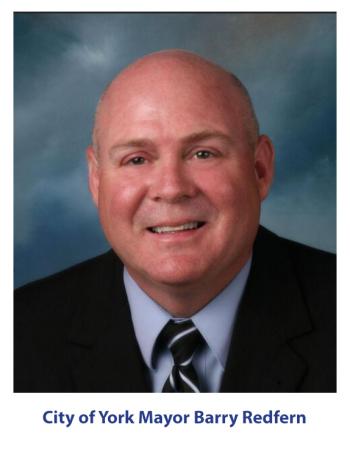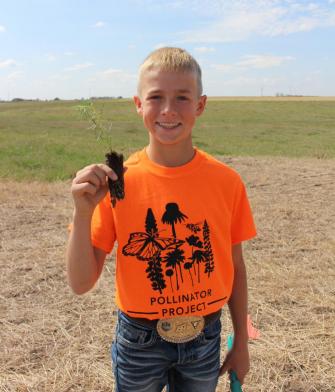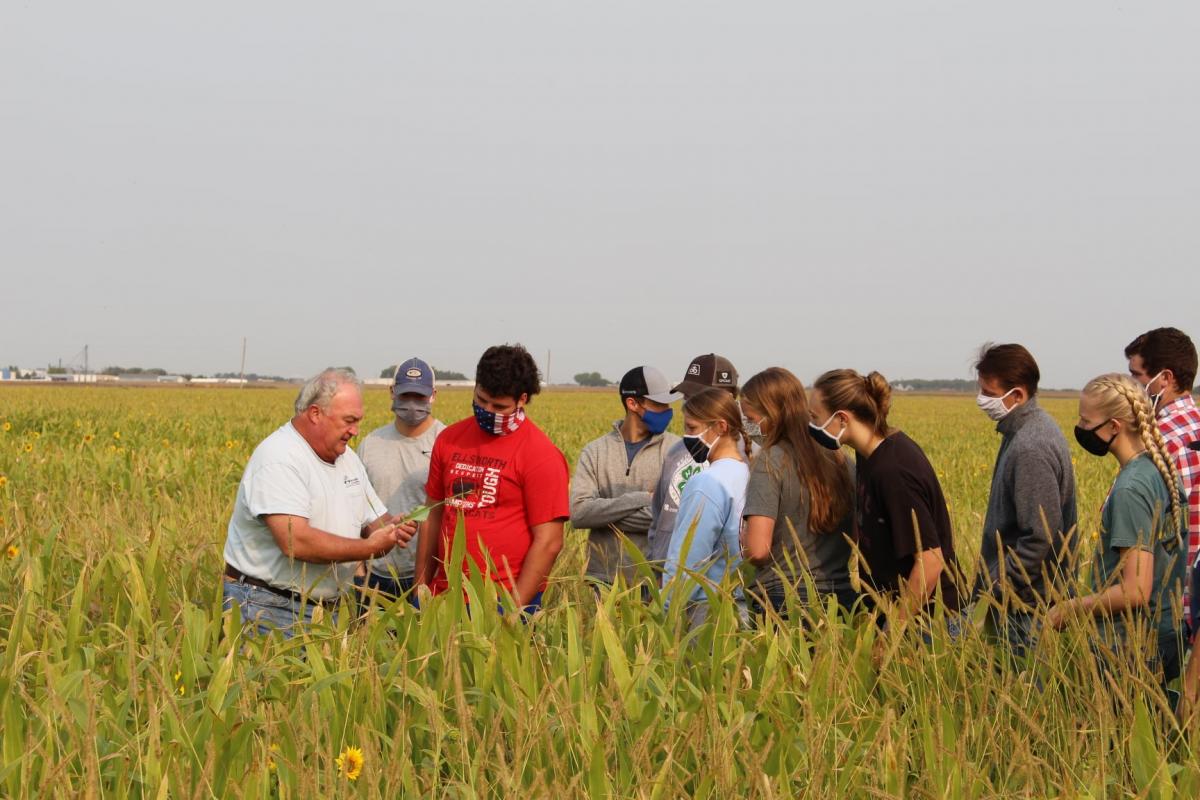City of York to Receive Statewide Recognition for Outstanding Community Conservation
Since 2017, the City of York and the Upper Big Blue Natural Resources District have worked together to protect water quality in the city’s wellfield through Project GROW (Growing Rotational crops On Wellfield). Five years into the program, the partnership continues to accomplish its goals and has also generated something unexpected: statewide recognition. The City of York will be recognized this fall with the 2022 Outstanding Community Conservation Award from the Nebraska Association for Resources Districts.
 Mayor Barry Redfern noted the value of the partnership to the city. “Project GROW has enabled us to use the wellfield property for community education and partnership. We appreciate how effective the Upper Big Blue NRD has been in making good use of the ground for education, research, and protection of our water resources.” Mayor Redfern credits Brandon Osentowski with leading the city’s partnership efforts over the past 5 years. “Brandon stepped up to accept the challenge of managing the well field ground in a new way to make this unique partnership work.”
Mayor Barry Redfern noted the value of the partnership to the city. “Project GROW has enabled us to use the wellfield property for community education and partnership. We appreciate how effective the Upper Big Blue NRD has been in making good use of the ground for education, research, and protection of our water resources.” Mayor Redfern credits Brandon Osentowski with leading the city’s partnership efforts over the past 5 years. “Brandon stepped up to accept the challenge of managing the well field ground in a new way to make this unique partnership work.”
The innovative partnership between the city and the NRD has prioritized restoring the soil in the wellfield as a means of protecting the water consumed by the residents of York, as healthy soil acts as a filtering system to the aquifer and decreases nitrogen leaching and contamination. Project GROW focuses on 160 acres of the total 400-acre wellfield and includes demonstration fields, community garden plots, a fruit orchard, and an extensive pollinator habitat. Using no-till, cover crops, livestock integration, and diverse crop rotations, the project seeks to improve soil health, decrease soil erosion, and improve water holding capacity, all while maintaining profitability.
Thanks to these measures, inputs of conventional fertilizer, herbicides, and pesticides have been minimal. When conventional fertilizer has been added, it has been applied in season using precision technology to make sure that the least amount could be used to the greatest effect, decreasing the risk of leaching to the groundwater supply.
Annual soil testing and other measurements have shown continuous improvement in the nutrient availability, nitrogen efficiency, infiltration rate, and soil organic matter in the Project GROW fields. In addition to the benefits to the citizenry of better water quality, Project GROW remains profitable and provides a net financial gain for the City of York.
Project GROW is just a stone’s throw away from city amenities including the ballpark complex, Payton Parker Lane Playground, and Family Aquatic Center. This proximity makes the soil health practices implemented at Project GROW more valuable: when the wind blows, the soil stays in place because of the cover crops and improved soil structure; the minimal use of chemical amendments means that there isn’t chemical drift impacting children and families using the nearby city facilities.
The community garden plots and fruit orchard also help supplement individual needs for locally grown food. This element of the project started with twelve 20’x15’ garden plots. Several more have been added to meet increased demand. The fruit orchard started with just berry bushes and has expanded to include grapes, as well as apple, cherry, and pear trees. The fruit is available to be harvested by the community groups, while the garden plots are reserved by individuals who pay a nominal use fee and are responsible for maintenance.
 The pollinator habitat on the northeast side of the property is a great place to spot many kinds of birds and insects who find ample habitat and food sources in the variety of wildflowers and grasses planted on this multi-acre plot. At a recent harvest, fox, deer, rabbit, quail, pheasants, raccoons, and coyotes were spotted by an astonished cooperating farmer.
The pollinator habitat on the northeast side of the property is a great place to spot many kinds of birds and insects who find ample habitat and food sources in the variety of wildflowers and grasses planted on this multi-acre plot. At a recent harvest, fox, deer, rabbit, quail, pheasants, raccoons, and coyotes were spotted by an astonished cooperating farmer.
An additional benefit of Project GROW has been opportunities for education. Students from York University and Concordia University have made regular visits to the GROW fields leading to academic research projects. Results from the growing practices at the demonstration fields are regularly communicated to agricultural producers in the area in the hopes that they will adopt similar practices to protect soil health and groundwater quality. Each December, producers, crop consultants, academics and others are invited to participate in the Project GROW Winter Workshop. Held at the Holthus Convention Center, this event draws 50-150 people per year to learn about improving soil health and other conservation practices and resources.
“We are proud of the partnership with the City of York and what we’ve been able to accomplish in the past five years at Project GROW,” said Marie Krausnick, assistant general manager of the Upper Big Blue NRD. “We hope that other communities will follow this example and work to improve the soils in their wellfields to protect groundwater. Protecting our water supplies is a responsibility we hold to each other as a society. We owe it to our neighbors as well as future generations to do all we can to safeguard the quality of our water supply.”
Dan Leininger with students from Concordia University exploring the diversity of cover crops at Project GROW in 2020

 Mayor Barry Redfern noted the value of the partnership to the city. “Project GROW has enabled us to use the wellfield property for community education and partnership. We appreciate how effective the Upper Big Blue NRD has been in making good use of the ground for education, research, and protection of our water resources.” Mayor Redfern credits Brandon Osentowski with leading the city’s partnership efforts over the past 5 years. “Brandon stepped up to accept the challenge of managing the well field ground in a new way to make this unique partnership work.”
Mayor Barry Redfern noted the value of the partnership to the city. “Project GROW has enabled us to use the wellfield property for community education and partnership. We appreciate how effective the Upper Big Blue NRD has been in making good use of the ground for education, research, and protection of our water resources.” Mayor Redfern credits Brandon Osentowski with leading the city’s partnership efforts over the past 5 years. “Brandon stepped up to accept the challenge of managing the well field ground in a new way to make this unique partnership work.”The innovative partnership between the city and the NRD has prioritized restoring the soil in the wellfield as a means of protecting the water consumed by the residents of York, as healthy soil acts as a filtering system to the aquifer and decreases nitrogen leaching and contamination. Project GROW focuses on 160 acres of the total 400-acre wellfield and includes demonstration fields, community garden plots, a fruit orchard, and an extensive pollinator habitat. Using no-till, cover crops, livestock integration, and diverse crop rotations, the project seeks to improve soil health, decrease soil erosion, and improve water holding capacity, all while maintaining profitability.
Thanks to these measures, inputs of conventional fertilizer, herbicides, and pesticides have been minimal. When conventional fertilizer has been added, it has been applied in season using precision technology to make sure that the least amount could be used to the greatest effect, decreasing the risk of leaching to the groundwater supply.
Annual soil testing and other measurements have shown continuous improvement in the nutrient availability, nitrogen efficiency, infiltration rate, and soil organic matter in the Project GROW fields. In addition to the benefits to the citizenry of better water quality, Project GROW remains profitable and provides a net financial gain for the City of York.
Project GROW is just a stone’s throw away from city amenities including the ballpark complex, Payton Parker Lane Playground, and Family Aquatic Center. This proximity makes the soil health practices implemented at Project GROW more valuable: when the wind blows, the soil stays in place because of the cover crops and improved soil structure; the minimal use of chemical amendments means that there isn’t chemical drift impacting children and families using the nearby city facilities.
The community garden plots and fruit orchard also help supplement individual needs for locally grown food. This element of the project started with twelve 20’x15’ garden plots. Several more have been added to meet increased demand. The fruit orchard started with just berry bushes and has expanded to include grapes, as well as apple, cherry, and pear trees. The fruit is available to be harvested by the community groups, while the garden plots are reserved by individuals who pay a nominal use fee and are responsible for maintenance.
 The pollinator habitat on the northeast side of the property is a great place to spot many kinds of birds and insects who find ample habitat and food sources in the variety of wildflowers and grasses planted on this multi-acre plot. At a recent harvest, fox, deer, rabbit, quail, pheasants, raccoons, and coyotes were spotted by an astonished cooperating farmer.
The pollinator habitat on the northeast side of the property is a great place to spot many kinds of birds and insects who find ample habitat and food sources in the variety of wildflowers and grasses planted on this multi-acre plot. At a recent harvest, fox, deer, rabbit, quail, pheasants, raccoons, and coyotes were spotted by an astonished cooperating farmer.An additional benefit of Project GROW has been opportunities for education. Students from York University and Concordia University have made regular visits to the GROW fields leading to academic research projects. Results from the growing practices at the demonstration fields are regularly communicated to agricultural producers in the area in the hopes that they will adopt similar practices to protect soil health and groundwater quality. Each December, producers, crop consultants, academics and others are invited to participate in the Project GROW Winter Workshop. Held at the Holthus Convention Center, this event draws 50-150 people per year to learn about improving soil health and other conservation practices and resources.
“We are proud of the partnership with the City of York and what we’ve been able to accomplish in the past five years at Project GROW,” said Marie Krausnick, assistant general manager of the Upper Big Blue NRD. “We hope that other communities will follow this example and work to improve the soils in their wellfields to protect groundwater. Protecting our water supplies is a responsibility we hold to each other as a society. We owe it to our neighbors as well as future generations to do all we can to safeguard the quality of our water supply.”
Dan Leininger with students from Concordia University exploring the diversity of cover crops at Project GROW in 2020


